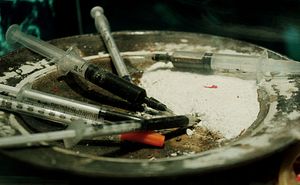On Wednesday, China’s Supreme People’s Court argued that serious drug crimes merit the death penalty. Serious cases involving “drug lords, professional drug dealers or re-offenders” as well as “drug smuggling, organized transnational drug crime and armed or violent drug crime” should all receive capital sentences, according to a circular released by the SPC. The same document advocated for more scrutiny on reprieves and probation for drug-related crimes.
China’s crackdown on drug use has been going strong for almost a year. Last June, President Xi Jinping and Premier Li Keqiang both denounced drug use and called for stronger efforts to fight drugs. That translated into increased action, with a rise in the number of drug-related arrests. Chinese law enforcement also sought to send a message by arresting high-profile targets, most notably Jackie Chan’s son Jaycee, who was arrested in August 2014 and spent six months in prison for possession of marijuana and “providing a shelter for others to abuse drugs.”
The increased attention to drug use in China results, as might be expected, from a growing drug problem. According to statistics released by the Supreme People’s Court in 2012, drug crimes more than doubled from 2006-2011, with the number of cases increasing from 31,350 to 69,751. That makes drug-related cases the fourth most common type of criminal case in China (with the other three being theft, causing deliberate harm to another person, and serious traffic accidents). From 2007 to 2011, drug-related crimes increased by an average of 15 percent each year. The SPC study notes that in the same period, there was little overall growth in other criminal cases, making drug crime a worrying anomaly.
The numbers have only continued to grow since then. In January, Xinhua reported that China handled 52,800 drug cases from late September to December 2014 alone, as part of a coordinated crackdown on drug crimes. In March 2015, Liu Yuejin, vice-director of the China National Narcotics Control Commission, told Xinhua that the estimated number of drug users in China was over 14 million. Liu admitted that China’s war on drugs was losing out to a growing number of drug users and the introduction of more addictive drugs. The drug industry in China is worth an estimated $82 billion, according to the CNNCC.
In addition to increasing in number, drug-related crime is also spreading geographically. In 2011, over 45 percent of drug crimes in China took place in Guangdong, Chongqing, Zhejiang, Yunnan, and Jiangsu. With the exception of Chongqing, located just to the east of Sichuan province, the other four provinces are clustered on China’s south and southeastern border. But a deputy presiding SPC judge, Ma Yan, told Xinhua last year that “drug crimes have been spreading from border and coastal areas inland.”
It’s apparently spreading north as well – northeastern province Liaoning has been a “major growth area” for drug cases over the past few years, Ma said. Outside analysts believe that North Korea (which borders Liaoning) has become a major source of methamphetamine smuggled into China, although Beijing is reluctant to publicly point the finger at its ally.
Still, Guangdong, Chongqing, and Zhejiang remain the top three provinces in terms of drug-related criminal cases, suggesting the rise is cases elsewhere is due to an overall growth in China’s drug problem rather than the relocation of drug smuggling and manufacturing centers.
How to address the problem? Liu, the CNNCC vice chief, told Xinhua the solution is sterner punishments for drug offenders – bringing us back to the SPC recommendation that the death penalty be used for serious drug crimes. In 2012, the SPC noted approvingly that drug crimes received harsher penalties on average than other crimes; 27.7 percent of drug smugglers or manufacturers were sentenced to at least five years in prison, compared to only 14.2 percent on average for other criminal cases. In the 2014 crackdown, a similar percentage of convicted drug criminals were sentenced to five years or more in prison (roughly 25 percent).
But there’s doubt as to whether harsher punishments can actually stem to tide of drug use in China. As a January New York Times article pointed out, even in the midst of China’s crackdown, drug dealers felt comfortable peddling their wares in public on the streets of Beijing. China could learn from the United States’ mistakes in this regard — after spending trillions on the “war on drugs” and arresting millions, there’s been little impact on rates of drug addiction. China’s own “war on drugs” may be doomed to follow the same fruitless path.
Thanks to Susan Finder for providing the SPC report on drug use in China.

































